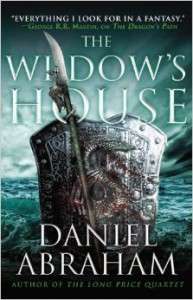The Widow’s House
Daniel Abraham
Orbit
Release Date: August 5, 2014
ISBN 978-0-316-20398-2
Book Four of “The Dagger and the Coin” series, and you can just feel the threads all being pulled taunt as we move towards a breaking point. We’re not there yet – there is one more book yet to come, to be published in August 2015 – but in The Widow’s House, all the pieces are being maneuvered into strategic positions on the game board in anticipation of a final showdown.
We know the backbone of the story well by now. A handful of players are integral in the ongoing conflict that flows out of the country of Antea: Geder Palliako, Regent of Antea and naive pawn of the Red Priests; Cithrin bel Sarcour, voice of the Medean Bank of Porte Oliva and unrequited love interest of the hapless Regent; Captain Marcus Wester, former war hero and mercenary guardian of Cithrin; Clara Kalliam, fallen Baroness of Osterling Fells who now works clandestinely against her former fealty; Kitap rol Keshmat (“Master Kit”), apostate priest of the Spider Goddess who has taken the role of a traveling player as he seeks a way to undermine the subversive sect he used to serve.
Antean forces are stretched thin as they continue to invade surrounding countries in order to stamp out or control perceived conspiracies against the realm. Soldiers pressed into service wearily hunker down to siege or are marched on yet another campaign rather than returning home but remain bolstered by the Red Priests of the Spider Goddess who amazingly never seem to know defeat despite the odds. Geder Palliako, unlikely ruler of Antea and “chosen one” of the Goddess, with his priest/counselor Basrahip, has turned his sights towards the sublimation of Porte Olivia and the country of Birancour in an attempt to possess Cithrin, the focus of his adolescent obsession.
In the meantime, thousands of people are dying under the relentless advancement of the Antean forces, and the entire race of Timzinae are threatened with enslavement due to a hackneyed conspiracy attributed to them that merely cloaks their inherent immunity to the effects of the Red Priests. Even the Antean nobility walk on tenterhooks, as anyone, regardless of position, status or former loyalty can be named as traitors to the realm with one unwitting conversation, one false move. Yet even with the growing unease, Geder’s popularity soars as time and again he triumphs on the field and in the political arena, ever with Basrahip at his side. Nevermind that Geder would rather spend his days in a room filled with books, studying antiquities and probing philosophies; as long as his rule allows for the expansion of the worship of the Spider Goddess, he sits on the seat of power.
Yet the bonds held in the iron fist of Antea show signs of fraying. Even within the Red Priesthood, a necessary infusion of forcibly indoctrinated priests give rise to a divergence in interpretations of the will of the Goddess, giving evidence of splintering vulnerabilities. Military commanders, although still obeying orders, have begun to question how long their troops can continue to function under uncompromising conditions. And now, Cithrin, Marcus and Master Kit have a powerful “new” weapon to use against the enemy: the recently reawakened Inys, last of the ancient dragons who millennia ago ruled the world and brought into being the very races that now wage war against each other.
Even a creature as powerful as a dragon, however, cannot turn the tide of war that has gripped the world. To stem the bloodshed, the foes of Antea must come up with new ways of circumventing the Regent’s armies and the Red Priests who travel with them. And especially, they must determine what it is that they are truly fighting against in order to unravel how to thwart it.
The Widow’s House is a very powerful installment of Daniel Abraham’s epic tale. Huge plot twists are unveiled that push the action towards an endpoint. Characters never step out of their set roles; instead, they embrace them fully; there is no longer any room for hiding or relying solely on subterfuge. That being said, this volume of “The Dagger and the Coin” does feel overwhelmingly as though it is positioning itself for the final volume to come, to make sure all the pieces are in place to bring about the dramatic conclusion to a story that has been building for hundreds of pages. Such treatment does not lessen the drama occurring in The Widow’s House – in many cases (especially Clara’s thread) it heightens it, since there is less and less “wiggle room” as the story plays out – but there is no doubt that all the action is moving towards some huge cliffhanger rather than a true pause in an extended narrative.
Indeed, by the end of the book, the reader does feel as if they are standing at the edge of a precipice. But after so much development and so many threads being woven together so artfully, after learning to appreciate so many characters (and coming to terms with not necessarily liking the “heroes” nor hating the “villians”) and being given some massive new ideas to ride rather than falling back on typical epic stylistic devices (thank you, Mr. Abraham!), standing at the edge of the precipice is exactly where you want to be.
My appetite is not only whetted, I’m absolutely ravenous! Next August can’t come quickly enough!

